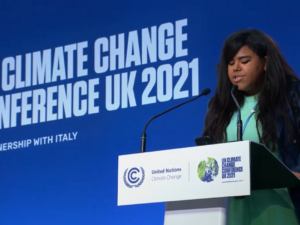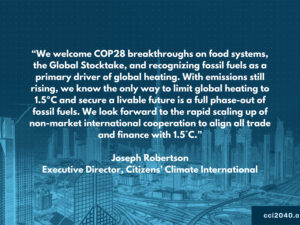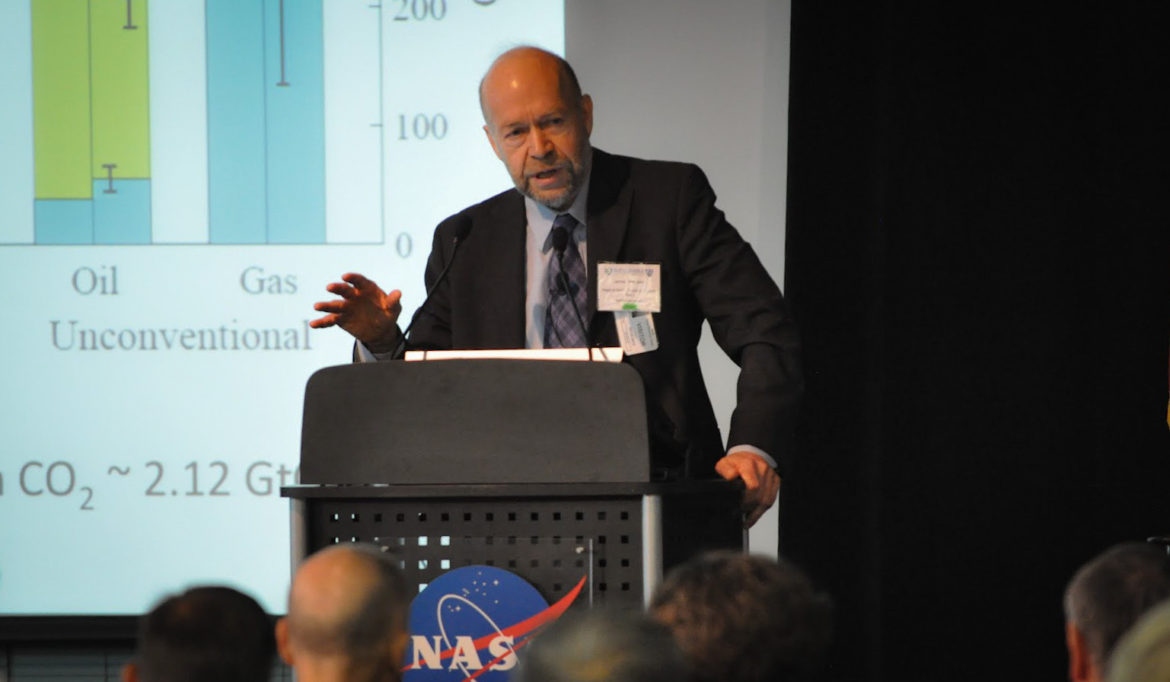
Dr. James Hansen has been a leading scientific voice on the urgency of climate action at least since June 1988, when he testified before the United States Congress that global heating threatened to destabilize Earth’s climate and create havoc for societies around the world. Three decades later, we are now seeing the projected impacts unfold in real time:
- Wildfires raging year-round, even in Siberia
- Steady and worsening decline in glacial ice
- Near disappearance of Arctic sea ice in summer
- Worsening mass extinction and threat to the biosphere
- Displacement of climate bands and life-giving monsoon rains
The Commodity Futures Trading Commission—a US financial regulator—warns climate disruption poses an existential threat to the financial system itself. The global hunger crisis linked to the COVID pandemic is deepened by the environmental stresses on agriculture due to global heating and climate disruption.
In a letter to UK Prime Minister Boris Johnson, Dr. Hansen highlights the stakes for the world and the historic opportunity now before Johnson. He calls for a world-leading example in the implementation of climate income—a carbon fee with 100% dividend to households.
As Dr. Hansen notes, such a plan “is socially just, anti-regressive. Seventy percent of the public comes out ahead.” He calls on the Prime Minister to be “a hero, a leader”, to show leadership by ensuring the economically efficient transformation of the UK energy economy, and inviting others to raise their national climate ambition ahead of COP26. We believe the COP26 is a chance to reinvent prosperity and secure a better future for everyone.
James Collis—a Citizens’ Climate volunteer leader in the UK—notes that “The UK Government recently stated its awareness of Carbon Fee and Dividend (aka Climate Income)” and that “Dr Hansen’s intervention was a welcome injection of passion and policy stimulation.”
The best future for the UK, and for the world, depends on the Prime Minister honoring his own team’s call for a Race to Zero (emissions) and a Race to Resilience, with transformative policy to match the challenge.
A letter to the Prime Minister
February 3, 2021
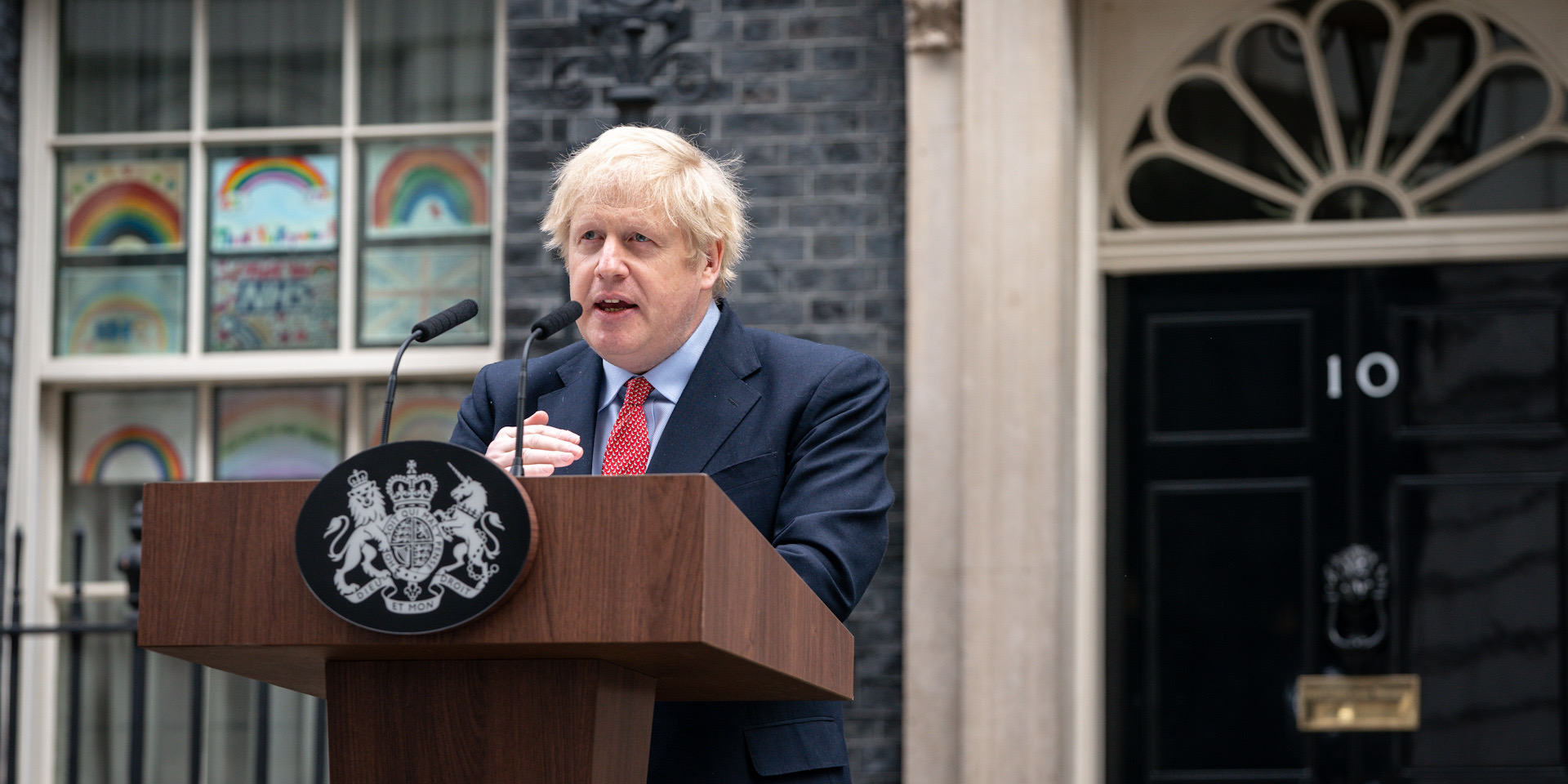
27/04/2020. London, United Kingdom. UK Prime Minister Boris Johnson gives a statement outside 10 Downing Street, as he returns to work following recovering from Coronavirus at Chequers. Picture by Pippa Fowles / No 10 Downing Street.
Dear Prime Minister Johnson,
I write nine months prior to the 26th Conference of Parties, with much at stake for the young people of the United Kingdom and every community suffering the ravages of the climate and ecological emergency. Increase in disease, drought, fire and flood stemming from recent climate-induced events and trends foretell much worse to come. Unless bold political leaders set a new course for our home planet.
Prime Minister Johnson, young people are fed up—and for good reason. They demand that political leaders follow the science and take the actions needed to preserve and restore a healthy climate. If this COP is like the prior ones—with soothing words and worthless ambitions—they will be justifiably outraged.
In leading the UK, as host to the COP, you have a chance to change the course of our climate trajectory, earning the UK and yourself historic accolades—or you can stick with business-almost-as-usual and be vilified in the streets of Glasgow, London, and around the world.
It would be easy to achieve this latter ignominy and humiliation. Just continue with the plan to open a new coal mine in Cumbria and continue to invest funds of the British public in fossil fuel projects overseas, in contemptuous disregard of the future of young people and nature.
The contrary path is not so easy, but, with your leadership, it is realistic. And by providing the acumen and gumption required to change our course, you will earn a special place in history and the gratitude of young people.
The science must be followed
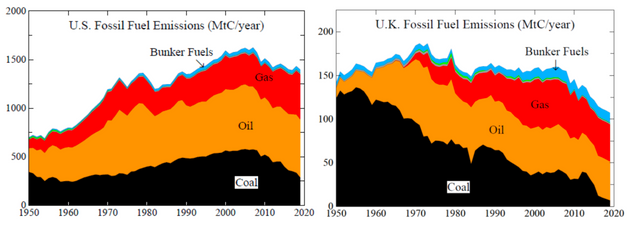
U.S. versus UK fossil fuel carbon emissions, in megatons of carbon per year
The science that must be followed is clear, not forbidding, and not in dispute among the experts. It is feasible to explain to the public what must be done and to persuade your Parliament. The great obstacle you must overcome—where others have failed—is that posed by the special financial interests that have bribed our governments and trashed our planet.
Some background information clarifies the science.
Recently, in reviewing UK progress in reducing fossil fuel emissions, I noted that your national emissions declined by 30 percent between 1997 (year of the Kyoto Protocol) and 2019, which compares with a reduction of 7 percent in the United States (see the chart above). The UK deserves congratulations.
Phase out fossil fuel emissions
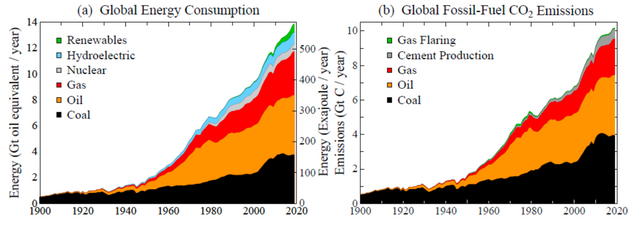
Global energy consumptions vs fossil-fuel emissions
Your progress reflects well on your parliamentary democracy. My wife and I were fortunate to witness the efforts of UK citizens and political leaders during the past two decades as that progress was achieved. It is our fervent hope that the UK will continue to provide leadership and affect the entire planet.
The UK is a special place, but it is not an island unto itself. British citizens will feel all the momentous changes to our planet’s atmosphere and suffer the blows from changing climate, should we fail to alter our course.
Our future will be determined by the changes to the global atmosphere. The most relevant change is the increasing amount of atmospheric carbon dioxide (CO2), which is driven by growing global energy consumption and resulting fossil fuel CO2 emissions.
Global energy use and emissions—still being tabulated—declined in the past year, but high emissions will continue unless decisive action informed by science is undertaken. Specifically, the science reveals that to stem the climate tide we need to phase out fossil fuel emissions by mid-century at the latest and obtain our energy from carbon-free sources such as renewable energy and nuclear power.
This may seem to be a tall order, but in fact it is doable. The required actions make sense for many reasons—our economic well-being, human health, and the future of young people and all life on the planet. The required actions are not painful—they will be beneficial, and they will increase social justice.
You may ask: what is the role of the UK in this? We are a small nation with negligible emissions on a global scale. We have little to do with the matter.
A historical role in climate-changing emissions
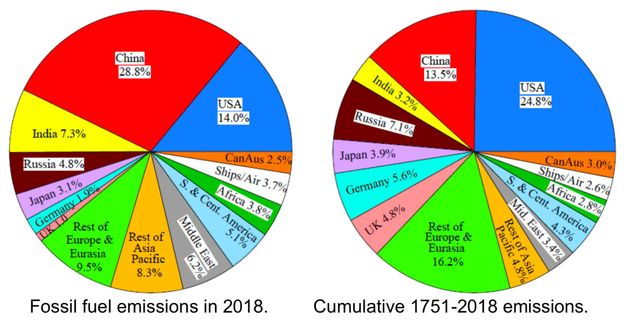
Contemporary vs. historical carbon emissions
In fact, the UK has much to do with the situation that we find ourselves in. And the UK has the potential to play a major role in rectifying the situation and leading the world to a brighter future.
Current and historical emissions are compared in the pie charts above. The UK accounts for about 1 percent of global emissions today, but global warming is proportional to cumulative emissions. The UK is responsible for about 5 percent of total emissions. UK and US cumulative emissions are each a factor of five larger than our respective portions of global population.
Our large energy use served a good purpose: It raised our standards of living. But in recent decades the climate situation has emerged with clarity. We must find a new energy path in the mature economies and cooperate with emerging economies, so they can raise living standards with clean carbon-free energies.
Increasing global emissions
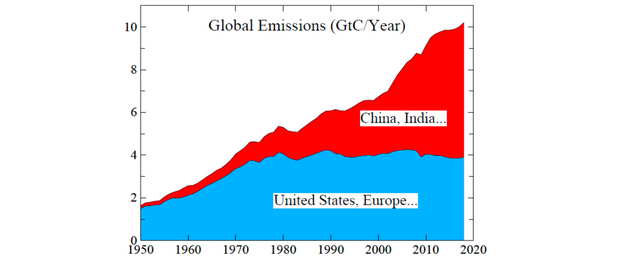
Fossil fuel emissions of mature (blue) and emerging (red) economies
The chart above summarizes the global situation. It shows fossil fuel emissions of mature (blue) and emerging (red) economies. Despite subsidies of renewable energy, global emissions increased. Despite the current health pandemic, high energy demand continues and energy growth will reemerge. However, an effective response to climate change requires that global emissions decline rapidly in the next few decades.
Young people are becoming increasingly sophisticated in their understanding. In the US, student government presidents at more than 350 colleges agreed to a bipartisan statement that they want our government to follow the science—climate, energy, and economics—and adopt a carbon fee & dividend policy.
That policy is dictated by science. Students were informed by their professors, who pointed to a joint resolution of 3,500 economists. In support of the young people, my colleague Daniel Miller and I wrote an op-ed explaining why fee and dividend is the socially and environmentally just way to fight climate change.
The economic fact is that an economy is most efficient if prices are honest. As long as the price of fossil fuels does not include the costs to society, people suffer for the sake of fossil fuel industry profits. The way to rectify this is a rising carbon fee collected at the domestic mine or port of entry, with 100 percent of the funds distributed uniformly to legal residents.
Fee & dividend as solution
Economic studies show that fee and dividend is the fastest way to drive down fossil fuel use while spurring innovation, clean energies and energy efficiency. And it is cost-free. In fact, it increases prosperity and government revenues.
It is socially just, anti-regressive. Seventy percent of the public comes out ahead. Most wealthy people—with larger carbon footprints from more travel, larger dwellings, and so on—will lose money, but they can afford it.
Economists agree that a carbon fee or tax is the easiest climate policy to make global. Once a major economic power has adopted it, it can be made near-global via border duties on products from countries without a carbon tax, thus encouraging widespread adoption of a carbon fee.
Why has such a policy not been adopted in the United States? Many congresspeople in the US are well-oiled, coal-fired and full of gas. Fee-and-dividend scares the bejesus out of the fossil fuel industry. But it need not be their kryptonite, because far-thinking companies can retool and invest in both carbon-free energy and negative emissions technologies.
The need for a leader
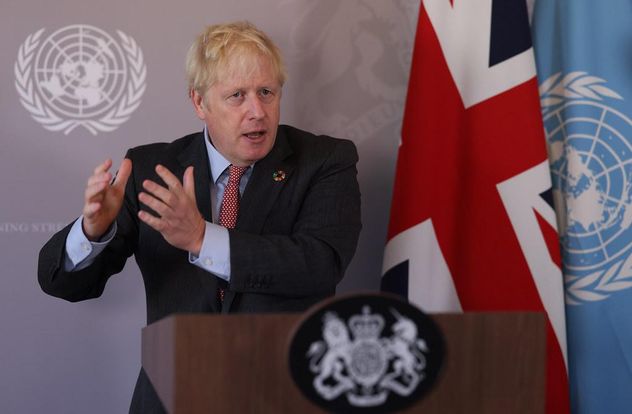
Andrew Parsons / No 10 Downing Street
Thus, one leader with the courage to take on the special interests could change the world’s energy course and alter the future for young people and other life on the planet. Where may we find such a leader?
I note that there is a Citizens Climate Lobby (CCL-UK) group in the UK that advocates this policy. I am sure that the leader, James Collis, would be glad to work with your team on the fee and dividend approach (which they term “climate income“).
There are also UK citizen climate leaders that are demanding an honest accounting of the climate impacts of government decision-making, including investments in energy projects. Towards this end, I am certain that Tim Crosland, director of PlanB.Earth, would be willing to work with your team.
Prime Minister Johnson, your actions and decisions now will either establish or undermine your claim to climate leadership. The upcoming UN climate conference will be an excellent venue for you to display your commitment.
I will attend that conference with my legal advisor, Daniel M. Galpern. If we can be of any assistance to your climate team in these matters, we would be pleased to help. Thank you for your consideration.
Yours sincerely,
James E. Hansen
James Hansen is the former director of NASA’s Goddard Institute for Space Studies. He is an adjunct professor at Columbia University’s Earth Institute, where he directs the Program on Climate Science, Awareness and Solutions.
He is also representing his granddaughter as well as “future generations” as plaintiffs in Juliana v. United States, a lawsuit against the United States government for failing to protect a stable climate system.
Follow Dr. Hansen’s work:
0 Comments
Leave a reply
You must be logged in to post a comment.



